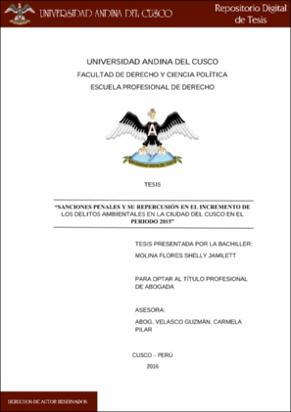| dc.contributor.advisor | Velasco Guzmán, Carmela Pilar | |
| dc.contributor.author | Molina Flores, Shelly Jamilett | |
| dc.date.accessioned | 2017-07-03T15:06:42Z | |
| dc.date.available | 2017-07-03T15:06:42Z | |
| dc.date.issued | 2016-12-21 | |
| dc.identifier.uri | https://hdl.handle.net/20.500.12557/802 | |
| dc.description.abstract | La vida del hombre siempre se ha destacado por el desarrollo de las sociedades, de la tecnología pero principalmente de la ciencia, y conjuntamente con estas se ve compartida la evolución a nivel de convivencia y
leyes; aquella normativa que tiene como finalidad conservar las buenas relaciones y vivir en un espacio de respeto y paz.
Pero al percatarnos del hombre actual, nos damos cuenta que su egoísmo y su avaricia lo llevan de la mano, y lo conducen a vivir en un ambiente desastroso, contaminado y que cada día se destruye de a pocos, pues en este afán por conservar nuestro ambiente y que la humanidad se preocupe más en conservarla para las generaciones futuras nacen las normas que rigen la conservación del medio ambiente y castigan aquellas acciones que van en contra de ella.
En ese entender esta investigación se dedicara a señalar aquellos puntos débiles en la aplicación de las sanciones que pueden colaborar con el incremento o disminución de delitos contra el medio ambiente y la repercusión que estos pueden tener en la población y la sociedad.
Al demostrarse entonces si estas normas son beneficiosas o no, podríamos pensar en una posible modificación en alguna de las partes integrantes de todo
el proceso que significa sancionar un delito ambiental y de esta forma potencializar el debido proceso y acelerar los procesos para el bienestar de la comunidad en su conjunto.
Después del análisis y el estudio estadístico, los valores que presenta el Ministerio Publico y el Poder Judicial durante los años 2014 y 2015 se llega a precisar que la comisión de delitos ambientales se encuentra en valores crecientes, evidenciado en la cantidad de denuncias, procesos y sentencias que son contabilizadas por estas instituciones. | es_PE |
| dc.description.abstract | The life of man has always been distinguished by the development of societies, of technology but mainly of science, and together with these is shared the evolution at the level of coexistence and laws; That regulation whose purpose is
to preserve good relations and live in a space of respect and peace.
But when we realize the current man, we realize that his selfishness and greed
lead him to live in a disastrous and contaminated environment and that every day is destroyed by a few, because in this eagerness to keep our Environment and that humanity is more concerned about conserving it for future generations
are born the rules that govern the conservation of the environment and punish
those actions that go against it.
In this understanding, this research will focus on those weak points in the application of sanctions that can contribute to the increase or decrease of crimes against the environment and the impact they may have on the population and society.
By demonstrating then whether these norms are beneficial or not, we could think of a possible modification in some of the integral parts of the whole process that means to sanction an environmental crime and in this way to potentiate the due process and to accelerate the processes for the welfare of the Community as a whole.
After the analysis and the statistical study, the values presented by the Public Ministry and the Judiciary during the years 2014 and 2015, it becomes clear that the commission of environmental crimes is in increasing values, evidenced
in the number of complaints, processes and Judgments that are accounted for by these institutions. | en_US |
| dc.description.uri | Tesis | es_PE |
| dc.format | application/pdf | es_PE |
| dc.language.iso | spa | es_PE |
| dc.publisher | Universidad Andina del Cusco | es_PE |
| dc.rights | info:eu-repo/semantics/openAccess | es_PE |
| dc.rights.uri | https://creativecommons.org/licenses/by-nc-nd/2.5/pe/ | es_PE |
| dc.source | Universidad Andina del Cusco | es_PE |
| dc.source | Repositorio Institucional - UAC | es_PE |
| dc.subject | Medio ambiente | es_PE |
| dc.subject | Sanciones | es_PE |
| dc.subject | Delitos | es_PE |
| dc.subject | Comunidad | es_PE |
| dc.title | Sanciones penales y su repercusión en el incremento de los delitos ambientales en la ciudad del Cusco en el periodo 2015. | es_PE |
| dc.type | info:eu-repo/semantics/bachelorThesis | es_PE |
| thesis.degree.name | Abogado | es_PE |
| thesis.degree.grantor | Universidad Andina del Cusco. Facultad de Derecho y Ciencia Política | es_PE |
| thesis.degree.level | Titulo Profesional | es_PE |
| thesis.degree.discipline | Derecho | es_PE |


